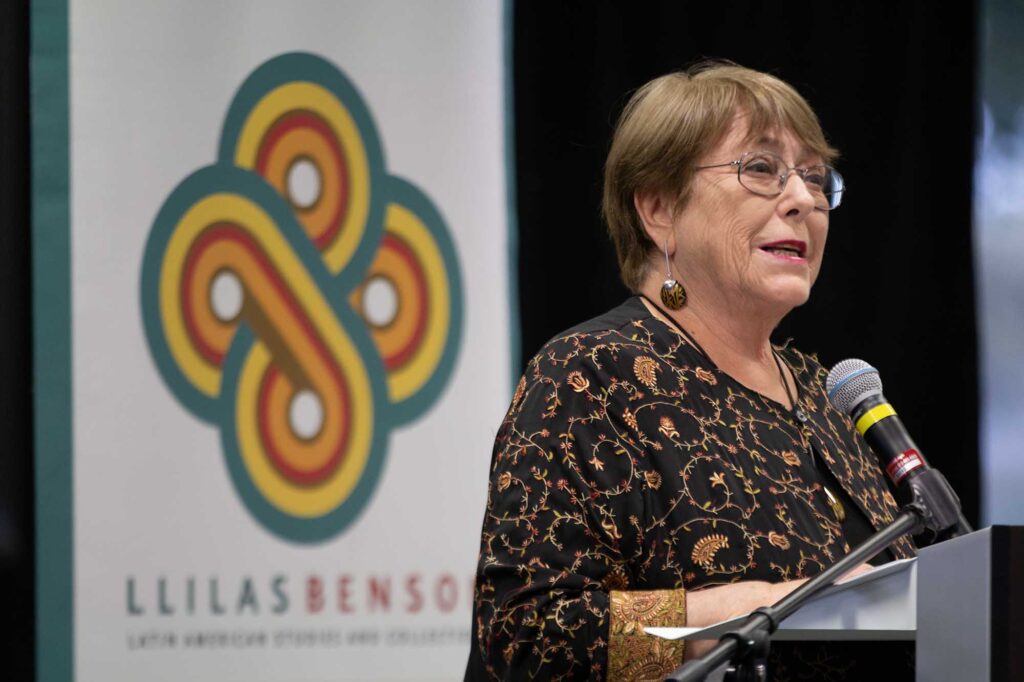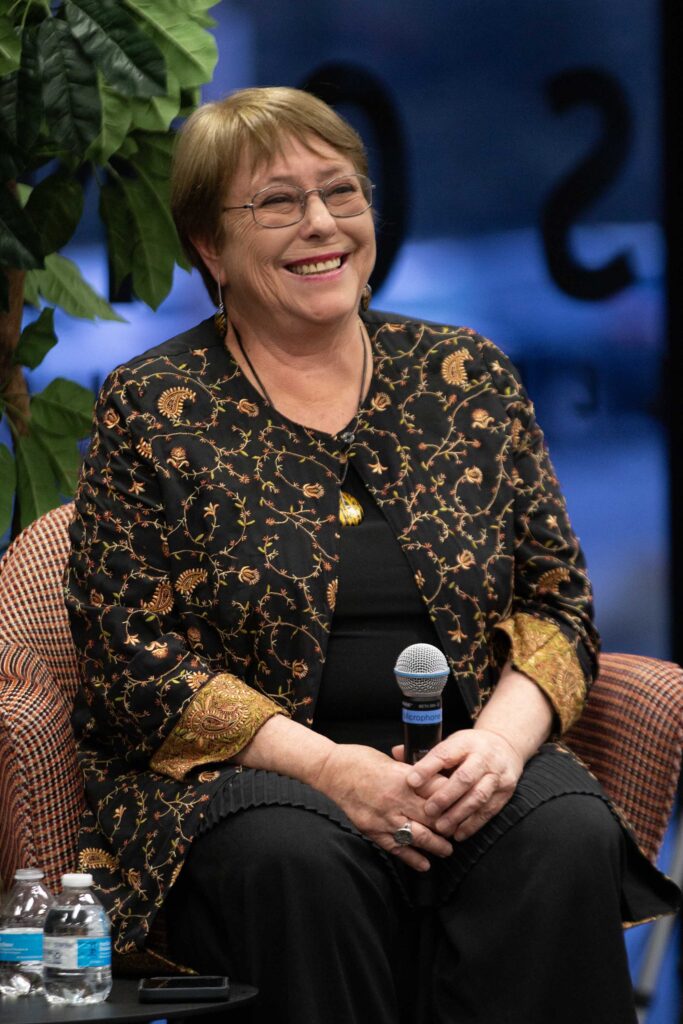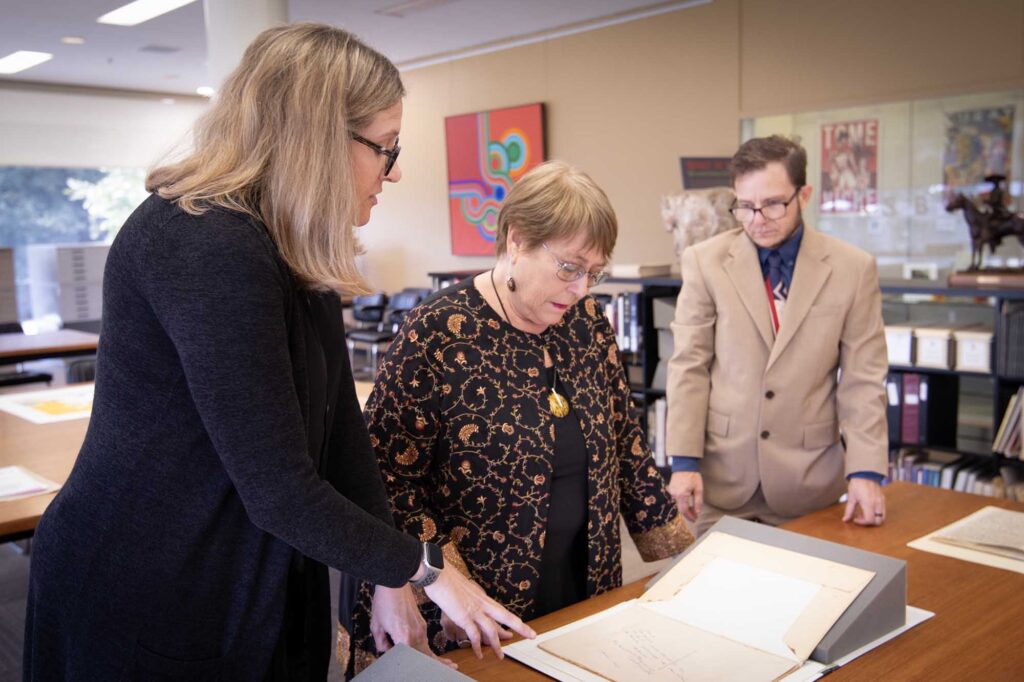By ADELA PINEDA FRANCO and PALOMA DÍAZ
THE MARY ANN FAULKNER DISTINGUISHED LECTURE SERIES in Latin American Public Affairs and Politics is LLILAS’s gateway to the world of politics and economics. Some of the questions LLILAS aims to address through this series are related to the challenges faced by Latin American societies today: the status of U.S.–Latin American relations in an era of polarized electorates and shifting geopolitical dynamics; the social and political impact of constitutionalist reforms; and the importance of regional strategies to enhance economic cooperation across borders.
Named for Mary Ann Faulkner, former first lady of UT during the period 1998–2006, this series honors her legacy and that of her husband, President Larry Faulkner, who made the growth of Latin American Studies at UT Austin a centerpiece of his term, bringing exceptional leaders to campus. This academic year, LLILAS partnered with the Nettie Lee Benson Latin American Collection as LLILAS Benson to host the Honorable Michelle Bachelet Jeria, the first woman to serve as president of Chile. Her talk, held at the Benson, was moderated by Dr. JR DeShazo, dean of the Lyndon B. Johnson School of Public Affairs.

With an unmatched sense of humor and genuine warmth, President Bache-let discussed her professional trajectory and the relationship between social practices and political institutions. She reflected on the particular historical conditions that were necessary for her to enter the world of politics as both a protagonist in the struggle for democracy and human rights, and a strategist to implement changes in these areas in her role as a national and world leader. This was done with the insight of one who understands how to bridge the realms of political practices and institutional frameworks.
President Bachelet has been a key figure in the process of Chile’s democratic consolidation and a leader in the pursuit of social progress on a global scale. As president of Chile in two non-consecutive terms, she set ambitious goals aimed at achieving equitable development, greater national integration, democratic stability, the advancement of sustainable energy, and care for natural resources, including the expansion of Chile’s marine protected areas. Her agenda, which encompassed constitutional and electoral reforms, as well as significant changes in education and tax policy, faced both internal and external challenges. Specific initiatives include the creation of a Solidarity Pension system to support retirees and the expansion of early-childhood education programs. She also established the Economic and Social Stabilization Fund, which helped Chile navigate the 2008 global financial crisis. During her second term, she extended public access to higher education and strengthened civil rights protections. Toward the end of her second term, she initiated the process of drafting a new constitution to replace the one dating from the Pinochet era.

Michelle Bachelet first gained public relevance as Minister of Health (2000–2002), and then as Minister of Defense (2002–2004), during the presidency of Ricardo Lagos (2000–2006). As Minister of Health, she drew upon her expertise as a surgeon and pediatrician to reform the Chilean healthcare system, improving conditions for providers of care. Her appointment as Minister of Defense—the first woman to hold the position in the region—was a milestone not only for Chile but for all Latin America. After her second presidential term, she served as United Nations High Commissioner for Human Rights from 2018 to 2022, addressing issues such as the impact of the COVID-19 pandemic on vulnerable populations and human rights violations around the world. Earlier in her career, she was appointed as the first executive director of the United Nations Entity for Gender Equality and the Empowerment of Women. In this role, Bachelet traveled the world promoting human rights and nonviolence.
During her visit to UT Austin, President Bachelet met with UT faculty and graduate students over lunch, where the discussion encompassed a wide range of topics, including constitutional reform, democratic backsliding, human rights, Latin American politics, and the recent history of Chile. A Chilean graduate student presented Bachelet with her recently published book on the history of Chilean cumbia, a topic in which the president took special interest. (She may well be one of the best cumbia-dancing presidents Chile has ever had!) Bachelet also visited the Benson Latin American Collection, where she had the opportunity to appreciate rare materials specially curated for her.

Michelle Bachelet has contributed to advancing women’s participation in politics and civic life, a focus of her lecture at UT. Her perspective on gender is inclusive and reflects her broader views on human rights. In her keynote address* at the tenth session of the Regional Conference on Women in Latin America and the Caribbean (Quito, 2007), she stated:
Being a woman means relating to others, with the ability to put yourself in someone else’s shoes. Such feelings are at home in the private sphere. Deploying this ability in the public field is a new adventure, sometimes hard and difficult, but tremendously rewarding. . . . The challenge of modern societies is knowing how to integrate male and female views into a whole. . . . When a woman comes to politics alone, the woman changes. When many women enter politics, politics changes. And clearly, one of the challenges and needs of our democracy is to improve the quality of politics. ✹
Adela Pineda Franco is director of LLILAS and Lozano Long Endowed Professor in Literary and Cultural Studies.
Paloma Díaz is assistant director of programs at LLILAS.
Note
Remarks translated from the original Spanish and condensed. The full text of Bachelet’s 2007 speech is available at cepal.org/sites/default/files/presentations/discursobachelet_0.pdf.
